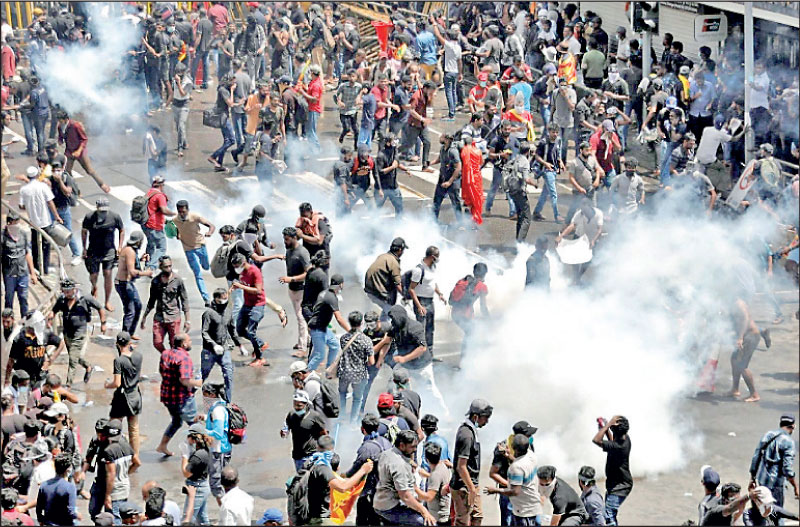Saturday Apr 05, 2025
Saturday Apr 05, 2025
Friday, 14 July 2023 02:48 - - {{hitsCtrl.values.hits}}

 A year after the events of 9–13 July, there are more questions than answers to the hoary issues of our unprecedented ‘People’s Revolution’.
A year after the events of 9–13 July, there are more questions than answers to the hoary issues of our unprecedented ‘People’s Revolution’.
Who – if any single individual or parties with vested interests acting in collusion – orchestrated ‘the long march’ on Colombo on 9 July 2022, which eventually ousted a sitting president through his resignation-in-exile on the 13th? A hidden hand whose intent was later writ large? An ancien régime embarrassed by a liability turned loose cannon? Were these one and the same?
What were the root causes of the months-long, nation-wide protests – other than the self-evident fuel, food, forex, fiscal policy, financial praxis, fertiliser and pharmaceuticals shortages that radicalised diverse communities?
From housewives beating pots and pans and their kitchen cabals; through trendy youth at iconic Independence Square; to sundry organic protests in farm, field and at Galle Face: What sociopolitical and economic phenomena did the ‘spontaneous’ uprising of the masses-as-one seek to eradicate?
Where has all that fire and fury gone?
Have an abundance of resources more readily available now, albeit at no small cost, banked the flames of outraged citizen dissent sufficiently that the powers that be may swan about again in truculent authoritarianism, brandishing antiterrorism laws and potentially oppressive media bills to boot?
And has the semblance of legality in an unelected, arguably mandate-less administration (that has space to reflect a sea of green tinged by shades of conviction blue in the face from snarling ‘we won the war’, ‘we won that poll’, ‘we have those votes from the last time round’) suitably impressed a populace more amenable to peace with plenty than justice without compromise – to quell the stoutest republican fervour?
First, we submit Aragalaya’s SWOT. Then, let us essay a ‘3F-theorem’ of sorts. And finally, raise a red flag.
Strengths
Authentic popular voice expressed peacefully to curb unbridled power
Boldness of organic citizens’ movement checks possible police/military backlash
Checks and balances to a collusive division and separation of powers sends strong signals to all three branches of government that the people are sovereign
Weaknesses
Intrinsic lack of vision, mission and purpose other than a short-term goal (regime change)
Not organised enough to seek the sustainable support of key civil society blocs (e.g. apex bodies of academic and professional organisations, biz and trade chambers, media) for sustainable changes/ongoing revolution)
Traduced as a Trojan horse by elites defending vested interests aligned to autocratic government necessary for crony capitalism
Justice being dispensed in the non-salutary form of vigilantism, mob violence
Opportunities
A common platform for apolitical action
An alternative to constitutional clause lacunae (‘right of recall’)
The potential in citizen hands to challenge and reform an entrenched culture of corruption and cronyism
Threats
Anarchy
Violent counterrevolution crackdown
Return to the status quo and a consolidation now of the corrupt, kleptocratic, incompetent regime facing ouster and possible criminal prosecution then
FORM: The Aragalaya of Jan-July 2022 was a legitimate citizens’ movement that brought to the fore popular dissent as a legal enough force to effect regime change or part-thereof, in the absence of a constitutionally guaranteed right of recall whereby nonperforming elected representatives could be removed from office midterm.
FUNCTION: But while it achieved part of its plan – the removal of a demonstrably incompetent president impervious to sustainable policy tweaks to avoid defaulting on Sri Lanka’s sovereign debt repayments due and subsequent bankruptcy – it failed to concretise a sustainable mechanism whereby the notion and impact of ‘popular sovereignty’ could be made viable for a better-governed republic.
FUNDAMENTAL: All if not most bloodless revolutions tend to reinstate the status quo by sly and subtle manipulation of the body politic’s pre-existent mechanisms.
Bliss – or blasé --- it was that dawn to be alive.
To be young at heart though middle aged in mind, and old and tired of the same old story since Independence in spirit was (if not heaven, or a fools’ paradise) distraction enough from all that has, will, and shall continue to ail our nation state short of a sustainable, ongoing, peaceful ‘people’s revolution’.
This was our storming of the Bastille (even the dates match), fall of the Berlin Wall, Tiananmen Square, whatever you like to compare it to.
The most pressing question now, perhaps on further reflection, is not whose Aragalaya it was, then.
But rather, who doesn’t want it to be remembered as a purer, more unalloyed and not as yet discredited event it is now, by dint of being hijacked by a ‘red brigade’ and/or other mercenaries, as well as political actors with mixed motives.
And if even now, as then, maybe like always, we fail to ask who benefits – ‘Cui bono?’ – from the guttering of the flame, our fate and future as a republic with potential will bleed in the gutter.
| Editor-at-large of LMD | ‘Long live the Republic & the Revolution’ |